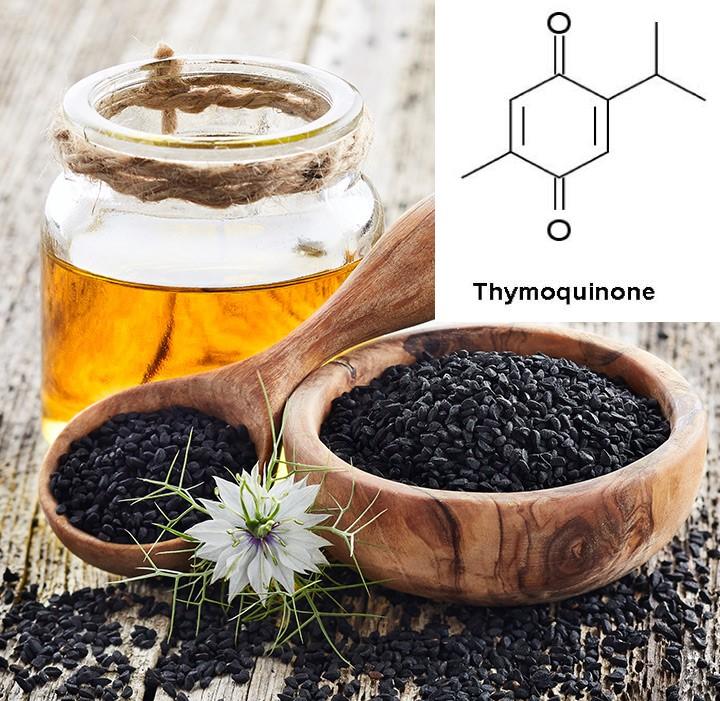Nigella sativa, commonly known as black seeds, is extensively developed and grown in Asia, Europe, and Middle East. It is among the most important drugs used in Ayurveda and Unani traditional systems of India. Muslims regard it as one of the greatest forms of healing as the use of black seeds is recommended in several hadiths (Ahmad et al., 2013). It was narrated by Abu Hurairah رضي الله عنه that the Prophet ﷺ described the benefits of black seeds by saying:
“In black seed there is healing for every disease, except the Sam.” “Sam means death. And black seed is Shuwniz.” (Sunan ibn Majah: 3447-3448, Sunan Tirmidhi: 2041)
For a long time, the properties of black seeds have been studied by many scientists. Black seeds have a cure for everything as proven by several scientific studies. These biological and therapeutic activities of black seeds include antioxidant, renal protective, hepatoprotective, gastroprotective, testicular protective, anti-fertility, bronchodilator, spasmolytic, analgesic, and anti-inflammatory, anthelmintic, antimicrobial, immunomodulatory, and antihypertensive properties. Diseases like asthma, sinusitis, and bronchitis can also be treated by these seeds as also narrated by Khalid bin Sa’d رضي الله عنه in the hadith:
“We went out and with us was Ghalib bin Abjar. He fell sick along the way, and when we came to Al-Madinah he was sick. Ibn Abu ‘Atiq came to visit him and said to us: ‘You should use this black seed. Take five or seven (seeds) and grind them to a powder, then drop them into his nose with drops of olive oil, on this side and on this side. For ‘Aishah narrated to them that she heard the Messenger of Allah (ﷺ) say: “This black seed is a healing for every disease, except the Sam.” I said: “What is the Sam?” He said: “Death.” (Sunan ibn Majah: 3449)
Black seeds also have their use for skin disorders, act as appetite stimulant, support immune system, and increase milk production in nursing mothers (Ahmad et al., 2013). The most active ingredient in black seeds is thymoquinone, found in 30-48% of the total seed constituents. Thymoquinone is especially useful in reducing blood glucose level, hence acting and anti-diabetic, along with having high anti-cancer properties (Mohebbati & Abbasnezhad, 2020). A study in 2010 suggested that using 1g/day of black seeds improved the overall health of type 2 diabetic patients, suggesting it to be a good adjuvant therapy (Bamosa et al., 2010). The anti-cancer activity of thymoquinone has been shown to be effective for blood, breast, colon, skin, kidney, lung, cervix, prostrate, liver, pancreas cancers along with fibrosarcoma (Khan et al., 2011). Some neurodegenerative diseases including multiple sclerosis, Parkinson’s, and Alzheimer’s disease have also shown beneficial effects of thymoquinone content of Nigella sativa because of its antipsychotic, anti-ischemic, anxiolytic, antidepressant, anticonvulsant, and memory enhancer properties (Javidi et al., 2016). According to a study in 2020, black seeds have also been proved to have beneficial effects for periodontal therapy, including periodontal regeneration and healing (Mekhemar et al., 2020).
To conclude, it is proven that whatever our Prophet Muhammad ﷺ has taught us is always true and beneficial for us. Taking approximately 1g/day of black seeds can prevent a person from many harmful and complex diseases.
References
Abū ʿAbd Allāh Muḥammad ibn Yazīd Ibn Mājah al-Rabʿī al-Qazwīnī (1952). Chapters on Medicine: Black Seed (Nigella Sativa), Sunan ibn Majah (Hadith 3447-3449). Darussalam. https://sunnah.com/ibnmajah:3447
Ahmad, A., Husain, A., Mujeeb, M., Khan, S. A., Najmi, A. K., Siddique, N. A., … & Anwar, F. (2013). A review on therapeutic potential of Nigella sativa: A miracle herb. Asian Pacific journal of tropical biomedicine, 3(5), 337-352. https://www.ncbi.nlm.nih.gov/pmc/articles/PMC3642442/
Bamosa, A. O., Kaatabi, H., Lebdaa, F. M., Elq, A. M., & Al-Sultanb, A. (2010). Effect of Nigella sativa seeds on the glycemic control of patients with type 2 diabetes mellitus. Indian J Physiol Pharmacol, 54(4), 344-54. https://pubmed.ncbi.nlm.nih.gov/21675032/
Imam Abu `Isa Muhammad at-Tirmidhi (883). Chapters on Medicine: What Has Been Related About Black Seed, Jami’ at-Tirmidhi (Hadith 2041). Darussalam. https://sunnah.com/tirmidhi:2041
Javidi, S., Razavi, B. M., & Hosseinzadeh, H. (2016). A review of neuropharmacology effects of Nigella sativa and its main component, thymoquinone. Phytotherapy research, 30(8), 1219-1229. https://pubmed.ncbi.nlm.nih.gov/27169925/
Khan, A., Chen, H. C., Tania, M., & Zhang, D. Z. (2011). Anticancer activities of Nigella sativa (black cumin). African Journal of Traditional, Complementary and Alternative Medicines, 8(5S). https://pubmed.ncbi.nlm.nih.gov/22754079/
Mekhemar, M., Hassan, Y., & Dörfer, C. (2020). Nigella sativa and thymoquinone: A natural blessing for periodontal therapy. Antioxidants, 9(12), 1260. https://www.ncbi.nlm.nih.gov/pmc/articles/PMC7764221/
Mohebbati, R., & Abbasnezhad, A. (2020). Effects of Nigella sativa on endothelial dysfunction in diabetes mellitus: A review. Journal of ethnopharmacology, 252, 112585. https://www.sciencedirect.com/science/article/abs/pii/S0378874119336554
Tavakkoli, A., Mahdian, V., Razavi, B. M., & Hosseinzadeh, H. (2017). Review on clinical trials of black seed (Nigella sativa) and its active constituent, thymoquinone. Journal of pharmacopuncture, 20(3), 179. https://www.ncbi.nlm.nih.gov/pmc/articles/PMC5633670/





